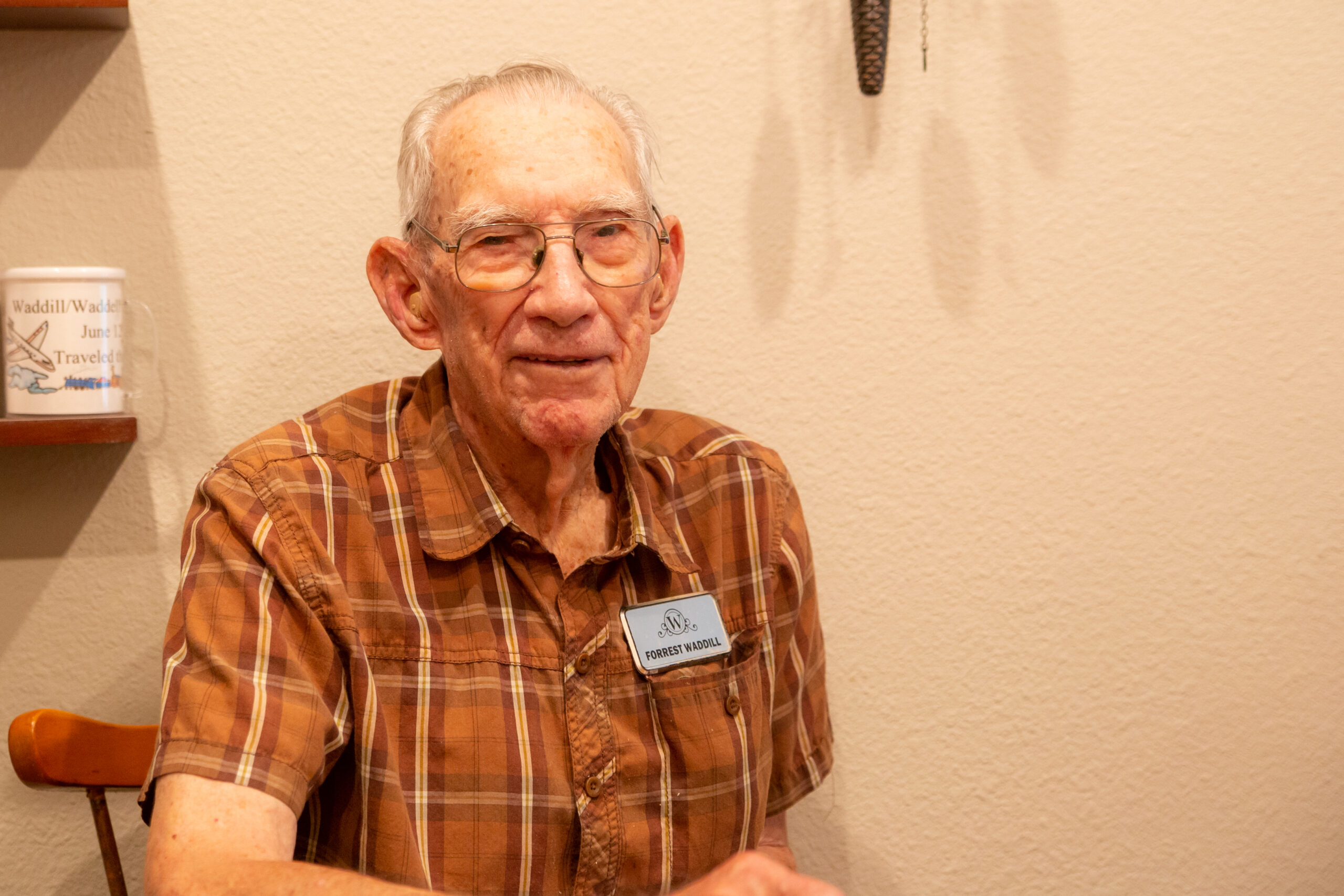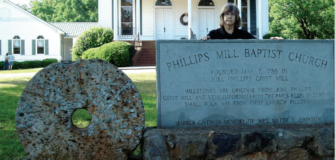Forrest Waddill goes to a bookcase and returns with something in his hand. He hands me an object. “Do you know what that is?”
“It’s rust colored, round, and heavy. It looks like a petrified rose,” I answer.
Forrest grins. “It’s a fossilized buffalo patty.”
He takes it back and hands me a second fossil. “What’s that?”
“I think it looks like leaves on a jade plant.”
He grins again. “Nope. That’s ant droppings.”
He may be 101 years old, but Forrest Waddill is certainly no fossil! He keeps his mind and body active. His daily routine is to get up about 6:00 AM. After breakfast he goes outside for a half mile walk, depending on the weather. Then he visits with other residents at Watermere at Woodland Lakes in Conroe and works on jigsaw puzzles until lunch. He takes a nap after lunch. He often bakes a pan of brownies to share when he goes back downstairs to work on his puzzle or take part in group activities like a trivia contest in the afternoon.
“I never expected to live to be a hundred and one years old,” Forrest Waddill said.
Early Years
Born December 18, 1921 in Edgewood, Texas, Forrest was the sixth of ten children born to Albert and Lillian Waddill. The family lived on a 160-acre farm near Star, Texas–which had three grocery stores, two garages, a filling station, the post office, and a blacksmith shop. “A hundred years ago, the blacksmith fixed anything that was broken, because there was no welding back then,” said Forrest. “The blacksmith would heat the iron and beat it back together.”
“I was nine years old when the Depression hit,” recalled Forrest. My family survived the Depression because we raised our own food, animals and a vegetable garden. All of us children worked on the farm. We bought a pressure cooker to can the food. We made ketchup, chili, jelly, and everything we could. We never missed a meal; we never went hungry. Everybody had their own place at the table. There were my parents and us kids: Clifford, Leonard, Leona, Grace, John, Forrest, Wesley, Bob, Henry, Dorothy.”
Even though food was plentiful, the family was affected by the Depression, because Forrest’s father Albert had bought 250 acres of land about a mile from their house. “He had paid all but $500 on it, and when he couldn’t pay it, the bank took the property. But he never mortgaged our home or livestock.”
Forrest left school after he completed the eighth grade to help on the family farm. “At 16, I could pick 400 pounds of cotton a day,” said Forrest. “Cotton sold for $45 or $50 a bale back then.” In the 1930s, students were required to complete the eleventh grade to receive a high school diploma.
He eventually got a job working on government projects. “I helped build the airports in Gainesville, Ft. Worth, Arlington, Mineral Wells, and Wichita Falls.”
Military Service in WWII
Forrest had a deferment because of his job. “They told me they could keep me out of the war, but everyone else was going, and I thought it was my time to go,” stated Forrest. “I enlisted on August 20, 1943. I was 22 years old.
“I joined the U.S. Navy Seabees and served in the 134
th and 135
th Construction Battalions in the Pacific islands of Tinian and Okinawa. I helped build two-mile-long airstrips for B-29 bombers to take off and land. On Okinawa, I helped build roads and living quarters.
“I had the best job I the service. I was a field mechanic. That gave me a jeep and a pass that let me through roadblocks anytime I wanted. I saw a lot of Okinawa. It was a muddy place because it rained a lot. The road was washed out in one place, and the trucks got stuck in the black mud at the roadblock. They’d wait until five vehicles were stuck, then bring out the bulldozer to push them over the hill.”
Forrest was honorably discharged on March 4, 1946. “I left Okinawa with a lot of money. I wish now that I had saved it or at least spent it more wisely. Men were getting discharged and getting married. I wasn’t about to get married right away.”
West Texas Days
Forrest moved to Midland in 1951 where he lived for sixty years. He and his brothers started the Waddill Brothers Painting Company and painted houses for over fifty years.
Forrest married Ann Manuel from Goldthwaite when he was 29 years old. They had two daughters, Sharon and Alicia. The marriage ended in divorce after 27 years.
Four years later, he married Christine Riggs who had three children: Dale Riggs, Anita Starrit, and Connie Flewellyn. The blended family had 5 children, 17 grandchildren, 38 great-grandchildren, and 9 great-great-grandchildren.
Forrest indulged his sense of adventure after he retired. He bought a trailer, and he and Christine visited 43 states, Canada, and Mexico. They visited many national parks and more than 80 state parks in Texas over twenty years. Christine died in 2014.
Forrest and his daughter Sharon Sanchez now share an apartment at Watermere. Sharon retired from Anadarko Petroleum, where she was an engineering technician.
Reflections
“I’ve seen a lot of changes during my lifetime. I’ve seen us go from a horse and buggy to sending men to the moon in spaceships.
My daddy bought a Model T Ford in 1925. They delivered it on a Sunday morning. We were already loaded up in the buggy to go to church. Daddy told them to just leave it there in front of the house, and we went on to church in the buggy. I asked Daddy years later why we didn’t just get in the car and go to church. He said, ‘Because I didn’t know how to drive the car.’”
While he appreciates many technological advances, Forrest is disappointed in what causes mistrust of one another. He grew up in a time when “My word is my bond.”
“The thing that bothers me most is this. When I was growing up, what you said is what you did. It’s not that way anymore. There are still good people, but a lot of people don’t keep their word. You’re supposed to do what you say you will do.”
Forrest keeps up with world events and knows that another world war will be fought much differently than the first two. “ Another war will wipe out civilization.”
Like most people, Forrest is concerned by the mass shootings at schools, malls, and clubs. “There are too many guns. Let everybody have whatever gun they want, but if it shoots more than one bullet at a time, the barrel should be full of lead.”
“Tell them what you did with your gun after the war,” Sharon says.
“All military weapons were to be turned back in; no one was to keep them, so I followed policy after WWII and turned in my gun when I was discharged. I haven’t owned a gun since.”
As for whether Americans are better off economically now than in the past, Forrest says, “Wages are higher than when I was a young man, but so is the cost of living. It balances out. The Depression left a mark on me. I’m careful with my money. My advice to young people is to be careful and cautious with how you spend your money.”
Daily Life
Forrest is an active member of a veteran organization. One of the highlights in his life was being chosen for the Honor Flight to Washington D.C. in 2015. He was one of the veterans of WWII who were flown to the nation’s capital and honored there for their service. A highlight of the trip for Forrest was when he got to meet Senator Bob Dole.
Forrest has a life-long interest in collecting fossils that began when he was young. Farming unearthed many arrowheads. “I liked the way they were different from each other, and I started collecting the arrowheads. I saved them in a cigar box,” said Forrest.
He contacted the geology department at Midland Jr. College and donated most of his collection to the college, because he had too many fossils to take when he and Sharon moved into the apartment. “And rocks are heavy,” Sharon pointed out.
Forrest’s Christian faith is an important part of his life. “God has been good to me. God has charge of my life. Everything good shows there is a God,” declared Forrest. Sharon added, “He studies his Bible every day.”
Forrest said, “My favorite Bible reading is the first three chapters of the Gospel of John. My favorite scripture is Ephesians 2:8, ‘For by grace are ye saved through faith; and that not of yourselves: it is the gift of God.’”
Adrienne Cooper, Resident Lifestyle Director at Watermere said, “Forrest is a wonderful example of how to live your life. He has lived through so much and has so much wisdom. He is kind and friendly to everyone. He and his family are all wonderful people, and I’m thankful that I get to know them.”
Forrest summed it up, “I’ve enjoyed life. Every part has had its place. I have no major regrets. I wish I’d led a better life. I could have lived a better life if I’d learned to control my mind.”


